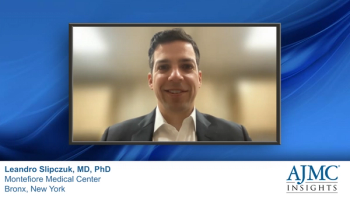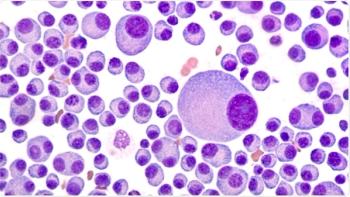
Clinical
Latest News
Latest Videos

CME Content
More News

Patients with cold agglutinin disease faced a 4.5-times greater risk of death during winter months, new data show.

Dr Leandro N. Slipczuk highlights the importance of cardiovascular treatment guidelines when deciding on patient care for those with ASCVD.

Three cardiovascular experts discuss the future of lipid management for patients with high-risk ASCVD.

The findings are based off an analysis of 98,159 individuals.

Experts warn, however, that human papillomavirus (HPV) vaccinations missed because of the COVID-19 pandemic could stymie this progress.

In a 2-sample Mendelian randomization study, researchers found a direct causal relationship between genetically predicted coffee consumption and higher risk of primary open-angle glaucoma.

Based on their findings, the researchers of the retrospective study are calling for close evaluation, careful monitoring, and appropriate treatment to mitigate complications and mortality.

Two periods of sacubitril/valsartan initiation were compared in a study population of patients with heart failure with reduced ejection fraction (HFrEF): less than 3 months or 3 or more months following first HFrEF diagnosis.

Type 1 diabetes (T1D) can be especially difficult to manage in older adults, so this new multinational review compared the safety and effectiveness of a hybrid closed-loop (HCL) system and sensor-augmented pump (SAP) therapy.

In their paper, the researchers detail the first, to their knowledge, case of a potential gain of function phenotype for IL-33 in a human.

According to recent findings, metabolizing disulfiram into diethyldithiocarbamate-copper complex creates a proteasome inhibitor-like treatment that enables the efficient killing of treatment-resistant multiple myeloma (MM) cells.

A retrospective study assessed hospital readmission rates in patients with sickle cell disease and acute chest syndrome who took angiotensin-converting enzyme inhibitors or angiotensin II receptor blockers vs those who did not.

Miruna Sasu, PhD, MBA, president and CEO of COTA Healthcare, delves into how real-world data and evidence generation have changed, both within the past year and since the beginning of the COVID-19 pandemic.

The drug yielded partial responses in 2 of 15 patients in this single-arm, phase 2 study.

The new findings come from a 15-year study examining the natural course of C-peptide in children and adolescents with type 1 diabetes (T1D).

Dr Ayman Al-Hendy discusses the diagnosis of uterine fibroids and endometriosis along with treatment goals.

Dr Steven McCarus discusses the journey of a patient with endometriosis through the health care system.

A prospective study found that a chronic obstructive pulmonary disease (COPD) and asthma physiology score (CAPS) of at least 21 points was a risk factor for in-hospital mortality in patients with acute exacerbations of COPD (AECOPD).

This new research may help investigators prevent skin lesions.

Negative positron emission tomography/CT examinations 6 months after induction therapy in patients with newly diagnosed multiple myeloma (MM) is associated with prolonged time to next treatment and overall survival.

Experts evaluated the future of cell and gene therapies in the United States and offered insights on potential value-based payment models for these treatments.

David Skomo, and Nick Page, PharmD, of WellDyne offered their perspectives on recent developments in precision medicine at the 2022 Asembia Specialty Pharmacy Summit.

This new study among a patient population living with type 1 diabetes compared their outcomes according to their type of insulin pump therapy: sensor-augmented pump, predictive low-glucose suspend, and hybrid closed-loop (HCL).

Very elderly patients with acute myeloid leukemia have historically been limited to less intensive, less effective treatment regimens. A recent series of cases suggests age alone should not be a limiting factor for effective treatment.

Cholangiocarcinoma (CCA), or bile duct cancer, is classified by its location, with intrahepatic CCA (iCCA) referring to those cancers that form in bile ducts within the liver.














